Features
It's Getting Better, Man
Oasis Albums Ranked Worst To Best
by Benjamin Ray
The giddy, adrenaline-fueled, self-assured rock rush of Oasis’ best songs rocketed them to quick fame, a short stint at the top and a long, slow decline. Their first two albums helped define the “Britpop” era and remain cornerstones of ‘90s rock, if not modern rock and alternative rock in general, while their slightly mellower albums of the 2000s exposed the strong songwriting and production skills of the brothers Gallagher. They were rough, cocksure, loud and equal turns fun and vulnerable, much like their British heroes before them. Below is a ranking of the band’s studio output.
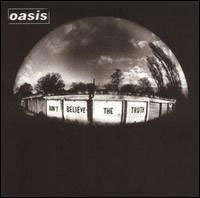 8. Don’t Believe The Truth (2005)
8. Don’t Believe The Truth (2005)
In which Oasis finally became a democracy and kind of lost the plot. This is probably the band’s most straightforward record, free of the hooks, attitude, clutter and everything else that makes the band’s best work so worthwhile. It’s also notable for allowing the other three band members to finally share songwriting space with Noel Gallagher, presenting the four as equals, but the songs just don’t have the kick and staying power as classic Oasis. By another band, this would be a highlight, but given the past heights, this one just doesn’t register as often as it should.
7. Heathen Chemistry (2002)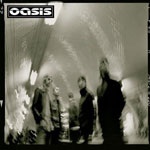
The first real album with Oasis’ second lineup is a bit of a misfire, offering all the layers of noise but forgetting the hooks and riffs necessary for rock like this. “The Hindu Times” is as close to classic Oasis as one will get, though it is overshadowed by the too-brief Liam Gallagher-penned “Songbird,” which strips away the rhythm section in favor of piano, acoustic guitar and sustained synthesizer notes as background noise for Liam’s honest, non-corny love song. As with any Oasis record, the music flies by in a colorful head rush that occasionally knocks you back with the guitar roar, but production alone is not enough to overcome songwriting deficiencies.
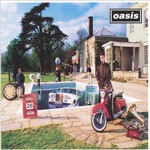 6. Be Here Now (1997)
6. Be Here Now (1997)
Bigger, longer, more seemed to be the bleary-eyed party mantra of Oasis in 1997, the year in which alternative rock pretty much collapsed in on itself with albums like this and Live’s Secret Samadhi. The band ratchets up everything about the first two albums on this disc, with overlong intros and extended/repetitive instrumental outros, endless overdubs to create a wall of sound, and songs that frequently surpass six minutes for no real reason. In concert, it would have been part of the experience, but on record it’s indulgent and unnecessary. But part of the album’s appeal is that self-confidence, which is why most of the songs are mid-tempo beasts that are both in-your-face and relaxed, something only Oasis could pull off at the time. With some editing, this could have been a truly fantastic album, but the excess keeps it short of the classic it yearns to be.
5. Standing On The Shoulder Of Giants (2000)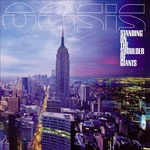
The oddest album in the Oasis catalog, but also one with some great songs that points the way forward after Be Here Now. The rhythm section of the band departed after that album, so Noel Gallagher more or less played the whole album himself, with support from the new members who had just arrived. This one is just as overproduced and deliberate as Be Here Now, but the excessive tendencies are reined in, allowing the songs to shine as much as the sound. The range of instruments used allows Noel to experiment a bit – the opening song is a guitar-saturated instrumental called “Fucking In The Bushes,” after all – while other songs have a more psychedelic, wistful air (the superb “Roll It Over” and “Where Did It All Go Wrong”). Noel spoke highly of the record, including “Go Let It Out” (rightly so), and much of it is a triumphant return in sound (less so in spirit) to classic Oasis. This is one that deserves to be rediscovered.
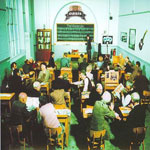 4. The Masterplan (1998)
4. The Masterplan (1998)
A lot of bands put out some great songs on B-sides, but only the Beatles, U2 and Oasis did so with consistency (you can make an argument for Pearl Jam and the Smiths to be included here, too). In the mid-‘90s, Noel Gallagher had so many songs coming out of him that shoehorning them on one album would have been impossible, so it was necessary to buy each single to get the two or three B-sides. The Masterplan sought to rectify this (at least for America) by rounding up the best of these songs and putting them on a disc, and it is to Oasis’ credit that not once does this sound like a typical “B-sides collection.” Simply put, many of these songs are fantastic and could easily have fit on the band’s first two albums; more importantly, this functions like an album, with a cohesive ebb and flow that starts with the stellar “Acquiesce” and ends with the solid title track. Those two, along with “Fade Away,” “Talk Tonight,” “(It’s Good) To Be Free” and the instrumental “The Swamp Song” (heard in snippets on Morning Glory) must be heard for even casual fans of the band.
3. Dig Out Your Soul (2008)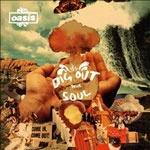
Nobody knew at the time this would be the final Oasis record, but it is one hell of a swan song. As expected, maturity has crept into the band’s songwriting and performances, but it only tempers their tendencies instead of replacing them. The songs here are among the band’s finest, all straightforward rock with psychedelic and ‘60s British rock overtones, but bluster is replaced with emotion and the record is better for it. A haze falls over “Falling Down” and “I’m Outta Time,” two of the more Beatles-focused songs here, while “The Shock of the Lightning” is an efficient, swirling song that ranks among the best since 1995. The stomping “Waiting For The Rapture” and “(Get Off Your High Horse Lady)” are also strong and sound unlike much else in the band’s catalog. A few tracks are Oasis by numbers, to be sure, but that’s not a bad thing. The band would split on the ensuing tour and form two new bands (Liam’s Beady Eye and Noel’s High Flying Birds), leaving this as one of the great goodbye records in rock history.
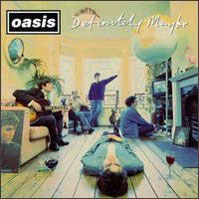 2. Definitely Maybe (1994)
2. Definitely Maybe (1994)
It’s been said that rock music is a concern of youth. Timeless truths like “I can’t get no satisfaction” and “Do you have the time to listen to me whine” and “Hope I die before I get old” and “I wanna be sedated” and “Here we are now, entertain us” sound completely natural coming from 22-year-olds, and you rarely see punk bands with members in their mid-40s (Green Day being an exception, but they stopped being punk a while back anyway). There’s an ebullience and bullheadedness that you possess at that age that infuses everything you do, particularly music, and this is precisely the reason Oasis’ debut is such a monster. Nothing about this record is tame or modest; the opening song is called “Rock And Roll Star,” the centerpiece is a six-minute tour de force called “Slide Away,” and the rest is snarling, youthful rock without the emotional baggage of the grunge scene. Calling it a party record would be accurate but would also be a disservice; AC/DC and Van Halen made party records, but Oasis also had moments of vulnerability that suggested actual humanity behind the booze and male bluster; witness “Live Forever” and “Married With Children,” the latter of which is routinely disrespectful but still fun. Still, once the riffs of “Supersonic” kick in, you will crank the radio and return to a time when you were 22, knew it all, fuck the adults, pass that bottle. One hell of a record.
1. (What’s The Story) Morning Glory? (1995)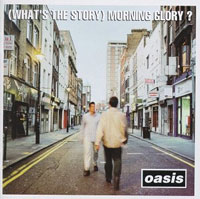
Fans debate whether this is superior to the debut, and I believe it is because it downplays the party-hearty aspects of Definitely Maybe and adds in emotional weight and true depth of songwriting, culminating in a truly stunning rock album. The wall of guitar sound creates an exciting rush in “Hello,” “Roll With It,” the brief snippets of “The Swamp Song” and “Morning Glory,” but the acoustic underpinnings of “Wonderwall,” the lovely, heartbreaking “Don’t Look Back In Anger” and the Richard Ashcroft tribute “Cast No Shadow” lend the album depth and majesty. It’s hard to imagine a transition from the debut to a record this good without something in between, as this sounds like the sort of grand statement most bands take a while to make. But there isn’t a moment on this release where the band doesn’t sound absolutely fearless and self-assured but not cocky, kind of like Who’s Next or Exile On Main St. And if “Hey Now” and “She’s Electric” are the weaker moments in the runtime, “Champagne Supernova” steamrolls over all in an utterly fantastic seven-minute epic that is one of the best songs of the ‘90s, vapid lyrics be damned. Oasis would release five more records after this one and never come close to being this good again until their actual career closer Dig Out Your Soul.